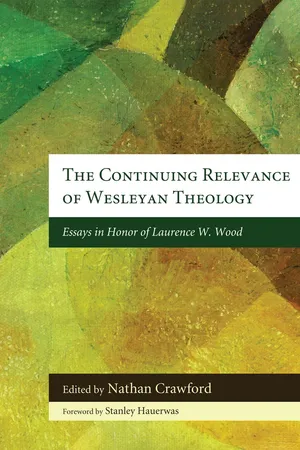![]()
part one
Rethinking the History
![]()
1
Augustine’s Interpretation of Romans 7:14–25
His Ordo Salutis and His Consistent Belief in a Christian’s Victory over Sin
Christopher T. Bounds
Introduction
The Apostle Paul declares in Rom 7:14–15, “We know that the law is spiritual; but I am unspiritual, sold as a slave to sin. I do not understand what I do. For what I want to do I do not do, but what I hate to do.”
The history and development of Augustine of Hippo’s exegesis of this passage has received significant scholarly attention. In his initial forays into Pauline study in 394/395, Propositions from the Epistle to the Romans, Augustine interpreted Rom 7:14–25 as a human being “under the law, prior to grace.” The “I” pictured here is the quintessential unregenerate person, who has knowledge of the law of God, senses true guilt for sinfulness, longs for deliverance, but is without the grace of Christ to overcome sin. In contrast, the Christian “under grace,” infused with the love of God, is victorious over sin and “ceases to sin.” In 396, Augustine reiterates his understanding in Eighty Three Different Questions and in his work of 398, To Simplician on Various Questions.
There is no hint of change in Augustine’s basic interpretive approach to Romans 7 until 411 in his treatise On the Merits and Remission of Sins, and on the Baptism of Infants. In his examination of Job’s righteousness, Augustine compares Job to the person in Rom 7:19–24 who “delights in the law of God after the inner man, while he sees another law in his members warring against the law of his mind.” Job is the type of individual who says, “The good that I would I do not: but the evil which I would not, that I do. Now if I do that I would not, it is no more I that do it, but sin that dwells in me.” At this point, there is no inconsistency with Augustine’s earlier teaching. However, later in the treatise he will argue that Christians who live a life of righteousness like Job are worthy of praise, but are not without sin and therefore must pray regularly the Lord’s Prayer “forgive us our trespasses.” Augustine implicitly connects Christians “under grace” with the person of Romans 7.
What is implied in On the Merits becomes explicit by 415 in Augustine’s On Man’s Perfection in Righteousness, which sets forth the key seminal ideas of his new interpretation of Romans 7. The person described by Paul in this passage is one “under grace.” The “divided self” pictured so poignantly by the Apostle is the Christian believer. Later, in a series of sermons preached in 417, Augustine clarifies that the “I” in this passage is Paul speaking about himself. Paul is testifying to his present Christian experience and providing a description of every Christian life before the resurrection of the body. By 421 in Against Two Letters of the Pelagians and in Against Julian Augustine acknowledges and repudiates completely his earliest interpretations of Romans 7. In 327, three years before his death, Augustine, writing his Retractions, renounces again his earliest position on Romans 7 as a description of an unconverted person “under law” and reiterates his belief that this is Paul’s Christian testimony and the experience of every person “under grace.”
Intimately tied to Augustine’s exegesis of Roman’s 7 is his ordo salutis or order of salvation. In his earliest written work on Paul, Propositions from the Epistle to the Romans, Augustine uses his comments to articulate a theological understanding of personal salvation in four stages. Indeed, this is the focus of Propositions. Interestingly, while Augustine changes his understanding of Romans 7 as he grows older, and for that matter, his reading of Romans 9–11 and the doctrine of election, his ordo salutis remains essentially the same throughout his life. He articulates it clearly in his early theological work, uses it as a reference point throughout his ministry as priest and bishop, and gives it significant treatment in his later treatises.
In his ordo Augustine consistently maintains that a Christian is empowered to walk in obedience to Christ through the infusion of love by the Holy Spirit. He describes a normative Christian life as one free from outward or willful sin. Even as his interpretation of Romans 7 changes, this basic understanding of a Christian’s life “under grace” does not, although it is nuanced differently in his later thought.
The question arises: how can Augustine do this with his complete reversal on Romans 7? If the Apostle Paul is describing his Christian life, and with him all Christians, in verses 14–25, how can Augustine maintain a theology of salvation in which a Christian is free from willful sin? The purpose of our paper is to answer this question. To do so, we will first summarize Augustine’s ordo salutis and highlight some nuances brought to his understanding in later reflection. Next, we will examine how Augustine reconciles his later interpretation of Romans 7:14–25 with his persistent teaching on a Christian’s outward compliance to the law. Then, we will look more specifically at the role of will or consent in the Christian “under grace.” Finally, we will conclude with a few summary remarks.
Augustine’s Ordo Salutis
Augustine in 394 identifies four basic stages in a person’s experience of salvation, subsequently carried throughout his ministry as priest and bishop: a life “prior to the law,” “under the law,” “under grace,” and “in peace.” However, he acknowledges that some Christians may not pass through all stages, such as the case of infant baptism in which a child moves from a life “prior to the law” to one “in grace,” bypassing the stage “under the law.”
He also sees his ordo salutis as an...
